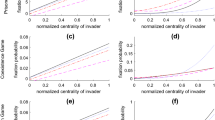Abstract:
It is argued that small-world networks are more suitable than ordinary graphs in modelling the diffusion of a concept (e.g. a technology, a disease, a tradition, ...). The coordination game with two strategies is studied on small-world networks, and it is shown that the time needed for a concept to dominate almost all of the network is of order , where N is the number of vertices. This result is different from regular graphs and from a result obtained by Young. The reason for the difference is explained. Continuous hawk-dove game is defined and a corresponding dynamical system is derived. Its steady state and stability are studied. Replicator dynamics for continuous hawk-dove game is derived without the concept of population. The resulting finite difference equation is studied. Finally continuous hawk-dove is simulated on small-world networks using Nash updating rule. The system is 2-cyclic for all the studied range.
Similar content being viewed by others
Author information
Authors and Affiliations
Additional information
Received 8 July 2000 and Received in final form 23 July 2000
Rights and permissions
About this article
Cite this article
Ahmed, E., Elgazzar, A. On coordination and continuous hawk-dove games on small-world networks. Eur. Phys. J. B 18, 159–162 (2000). https://doi.org/10.1007/s100510070088
Issue Date:
DOI: https://doi.org/10.1007/s100510070088




